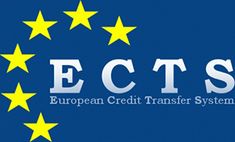European Credit Transfer and Accumulation System "ECTS"
The European Credit Transfer and Accumulation System (ECTS) was developed by the European Commission as a means of facilitating academic recognition and the transfer of credits from one university to another using a common basis of measurement. ECTS provides a means of building bridges between institutions and opening up more study offers to students. ETCS simplyfies the recognition of learning achievements of students for the institutions through the use of a commonly understood system – credits and grades. It also provides a means to interpret national systems of grading in higher education. The ECTS system is based on three core elements:
- Information (on study programmes and student achievement)
- Mutual agreement (between the partner institutions and the student) and
- The use of ECTS credits (to indicate student workload).
Full academic recognition is a basic requirement for student mobility within the Erasmus and Socrates Programmes. Full academic recognition means that the study period abroad (including examinations or other forms of assessment) replaces a comparable period of study at the home university (including examinations or other forms of assessment). This holds also if the content of the study programme agreed upon may differ.
In ECTS, 60 credits represent the workload of an academic year of study, normally 30 credits for a semester and 20 credits for a trimester. Until recently, in Austrian higher education, course units have been traditionally measured in semester hours per week, but now they are also measured in ECTS credits. The number of ECTS credits for each course is indicated in the online course catalogue of BOKU. Students receive ECTS upon the successful completion of a course. Credits are transferred from one university to another on the basis of a prior learning agreement between the student and the universities involved. Course information (course content, prerequisites, assessment etc.) is available in the online course catalogue.
Acknowledgement by the home university is based on the Learning Agreement, which is agreed upon by both participating universities as well as the student himself/herself. After students have completed their studies at BOKU, they will receive a transcript of records which lists all courses completed and the grade according to the Austrian and ECTS scheme. This will provide your home institution with the information necessary to transfer courses.
ECTS Grading Scale
The ECTS grading scale is based on a combined use of appropriate key terms and numerical definitions, which ensures the system's transparency.
Austrian grades are comparable to ECTS grades as follows (new since 01.10.2015):
| Austrian grade | ECTS grade | Verbal |
|---|---|---|
| 1 (sehr gut) | A | Excellent |
| 2 (gut) | B | Good |
| 3 (befriedigend) | C | Satisfactory |
| 4 (genügend) | D/E | Pass |
| 5 (nicht genügend) | F/FX | Fail |
At BOKU, 1 ECTS equals 25 hours of work.
Contact
ECTS Institutional Coordinator
Dr. Margarita Calderon-Peter
Peter-Jordan-Strasse 82a
A-1190 Wien
Tel.: +43 1 47654 32001
Fax: +43 1 47654 32009
Email: margarita.calderon-peter(at)boku.ac.at

